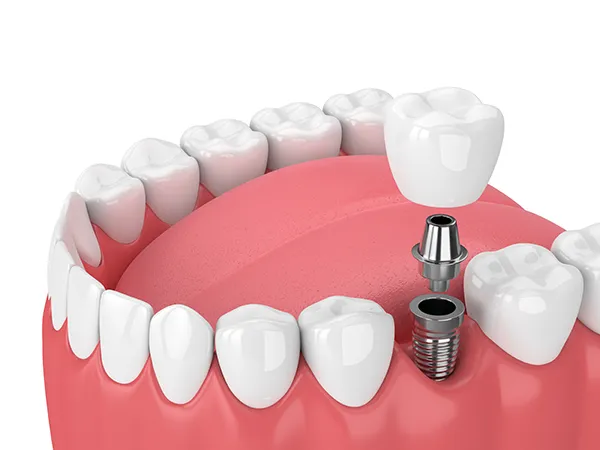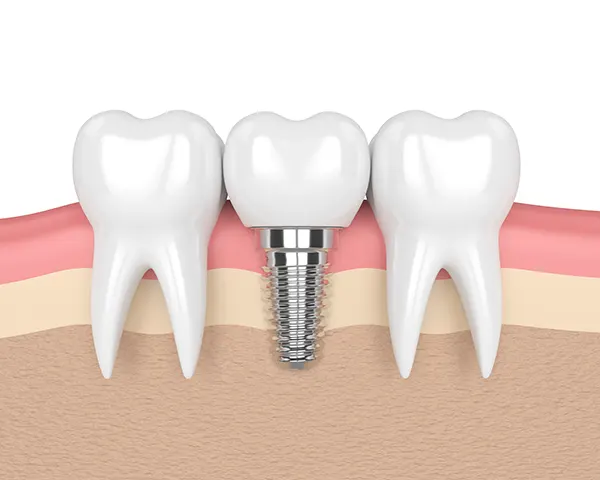Dental implants have revolutionized modern dentistry, offering a permanent and natural-looking solution for replacing missing teeth. Unlike traditional options like dentures or bridges, implants are designed to fuse with the jawbone, providing unmatched stability, durability, and functionality. Whether you’re missing a single tooth or need full arch restoration, dental implants offer the closest alternative to natural teeth—both in appearance and performance.
If you want to restore your smile, call the Rolling Plains Dentistry team at 940-663-5353 to schedule an appointment today, and find out if you are a good candidate for dental implants.
What Are Dental Implants?
 Dental implants are small titanium posts that are surgically placed into the jawbone beneath the gums. These posts serve as artificial tooth roots that connect to an abutment and anchor crowns, an implant-supported bridge, or implant-supported dentures to the jaw. The titanium material used for the implant is biocompatible, it fuses with the jawbone in a process called osseointegration. This fusion provides stability and strength to the implant and in turn, the restoration that is anchored to it.
Dental implants are small titanium posts that are surgically placed into the jawbone beneath the gums. These posts serve as artificial tooth roots that connect to an abutment and anchor crowns, an implant-supported bridge, or implant-supported dentures to the jaw. The titanium material used for the implant is biocompatible, it fuses with the jawbone in a process called osseointegration. This fusion provides stability and strength to the implant and in turn, the restoration that is anchored to it. Types of Dental Implants
There are two types of dental implants. The choice depends on the bone structure of each patient's jaw. When we lose teeth, the density of the jaw deteriorates from the lack of stimulation of tooth roots. Over time, the jaw can lose so much bone density that it cannot support the typical endosteal implants, so subperiosteal implants must be used.
Endosteal Implants are the most commonly used type of implant. They are directly inserted into the jawbone and after the surrounding bone has healed, a secondary surgery is performed to connect a post, the abutment, to the original implant. Finally, a custom crown, an implant-supported bridge, or implant-supported dentures are attached to the abutment(s).
Subperiosteal implants consist of a metal frame that is fitted onto the jaw just below the gum tissue. Once the gums have fully healed, the frame becomes fixed to the jawbone. Abutments are attached to the subperiosteal frame through the gums, and the restoration is attached to the abutments.
The Dental Implant Procedure
A patient's dental implant procedure begins with a detailed examination by our team that includes X-rays, and possibly CT scans. These images are taken to determine if the patient has the bone density required to support implants, as well as the placement of the implants. If the jaw is not dense enough for implants, a bone graft may be required before placement, or a different restoration option may be needed.
Next, we place the dental implants into the jawbone while the patient is under local anesthesia. The placement procedure is followed by a healing period of several months. The dental implants stimulate osseointegration, where the jaw fuses with the implants, but bone growth takes time.
Once the healing period is complete, an abutment (the post that connects the implant to the crown, bridge, or denture) is attached to the implant.
Lastly, an individual crown, an implant-supported bridge, or implant-supported dentures are custom made to mimic the patient's natural teeth, and fitted to the abutment to complete the process.

Benefits of Dental Implants
Dental implants are a durable and long-lasting solution for tooth replacement, often lasting a lifetime with proper care. Unlike other options, they don’t require any modification to surrounding teeth, allowing you to preserve more of your natural teeth, which benefits your overall oral health.
Implants also eliminate the hassle of removing dentures for cleaning and don’t need adhesives to stay in place. You can brush them just like your natural teeth, and they remain secure. Since implants fuse with the bone, they become a permanent part of your mouth and feel completely natural. This means eating and speaking are just as comfortable and natural as they’ve always been, without the slipping or discomfort that can come with dentures.
Who Can Get Dental Implants?
The ideal candidate for a dental implant has good general health, and oral health as well. Adequate bone density in the jaw is required to support the implant, but a bone graft may be an option to repair the density of the jawbone. In addition, the best candidates have healthy gum tissues that are free of periodontal gum disease.
Dental implants are a durable and effective solution to replace missing teeth. They provide a secure base for artificial teeth that look, feel, and function just like natural teeth. Whether you are missing one tooth or several, dental implants offer a restored, functional smile, and revitalized oral health. They boost confidence and improve well being overall. The accessibility and affordability of dental implants continues to improve. It is a viable option for a growing number of people seeking a permanent solution to tooth loss.
FAQs
What are dental implants?
Dental implants are titanium posts surgically placed into the jawbone to replace missing tooth roots. They provide a stable foundation for crowns, bridges, or dentures, offering a durable and natural-looking solution for tooth replacement.
What are the types of dental implants?
The two main types of dental implants are endosteal implants, which are placed directly into the jawbone, and subperiosteal implants, which are positioned on top of the jawbone beneath the gum tissue. The choice depends on the patient's jawbone density and overall oral health.
What is the procedure for getting dental implants?
The dental implant procedure begins with a detailed exam, including X-rays or CT scans. Implants are then surgically placed into the jawbone under local anesthesia, followed by a healing period for osseointegration. Finally, an abutment and custom restoration (crown, bridge, or denture) are attached to complete the process.
What are the benefits of dental implants?
Dental implants provide a permanent and natural-looking solution for tooth loss. They offer durability, stability, and functionality without affecting surrounding teeth. Implants prevent bone loss, feel like natural teeth, and eliminate the need for removable dentures or adhesives.
Who is a good candidate for dental implants?
Good candidates for dental implants have healthy gums, sufficient jawbone density, and good overall health. If the jawbone lacks density, bone grafting may be an option. Candidates should also have no active gum disease or health conditions that could affect healing.
How long do dental implants last?
With proper care and maintenance, dental implants can last a lifetime. The restoration (crown, bridge, or denture) attached to the implant may require replacement over time, but the implant itself is designed for long-term durability.
Contact Us Today
If you want to restore your smile with a permanent solution, and would like to find out if you are a good candidate for dental implants, please call the Rolling Plains Dentistry team at 940-663-5353 to schedule an appointment today.


